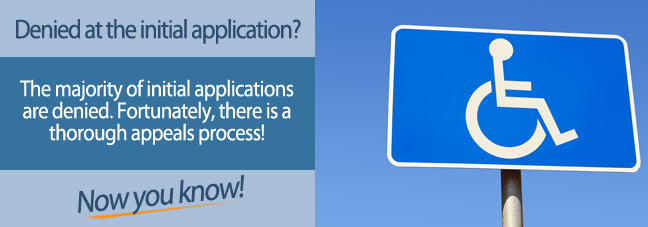Social Security disability benefits were created to help disabled Americans and their families by providing consistent income, vocational rehabilitation, and other services. If you can get approved, disability benefits give you and your family the ability to face everyday financial challenges when you’re unable to work.
Benefits may be available to you in two forms: Social Security Disability Insurance (SSDI) and Supplemental Security Income (SSI). Each program has its own eligibility rules and you may be denied for one program, even if you are approved for the other.
The Initial Review Stage of a Disability Claim
The first review of your disability application is the “initial review.” After you submit your application, a disability examiner is assigned to your claim. This examiner will first review your application against disability listings in the Social Security Administration (SSA’s) Blue Book.
If your application doesn’t meet or closely match a listing, then the examiner will initiate a “residual functional capacity” or RFC analysis.
In the RFC analysis, you’ll receive questionnaires in the mail that you must complete and return within 10 days of the date of the notice. Failure to meet this deadline can cause you to be denied benefits.
Your doctor will also receive questionnaires he or she must complete within the RFC deadline requirements. If your doctor is slow to return forms, then you may be denied for this reason as well.
Denial and Approval Rates
The rate of disability denials at the initial review stage is high and can happen for a number of reasons. A lack of sufficient medical evidence is perhaps the most common cause.
Failure on the part of the applicant or his or her doctor to respond to inquiries from the SSA for further information also commonly contributes to high denial rates.
Nationwide averages put initial denial rates at about 78 percent, including both SSDI and SSI applications. This means only about 22 out of every 100 applicants are approved during the first review.
What to do if You’re Denied
The reason for your denial affects how you proceed. For instance, if you are denied SSI benefits because you do not financially qualify, then you cannot appeal the SSA’s decision.
This is because SSI is a need-based program with strict financial eligibility rules you must meet. If your finances change in the future, you can reapply and potentially qualify at that time though.
If you are denied SSI or SSDI benefits for medical reasons however, then you can request a second review of your claim and file an appeal later, if you are denied a second time. Disability approval rates at the second review and appeal stages are higher, but you will still need to work to prove you’re eligible for benefits.
A disability attorney or advocate can potentially increase your chances of approval. He or she can help you complete the necessary forms, gather additional evidence to support your claim, and follow up with the SSA to ensure your claim gets the attention it deserves.
